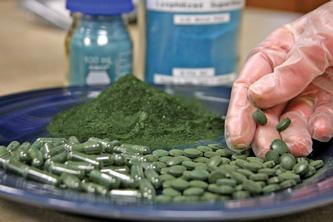|
Harvesting Klamath algae
H&N photo by Andrew Mariman
 Desert
Lake Technologies, a local company that harvests algae from Upper
Klamath Desert
Lake Technologies, a local company that harvests algae from Upper
Klamath
Lake and sells the green goods as dietary supplements, is
expanding its storage capabilities by acquiring the Klamath Cold
Storage on Spring Street. Local businesses still bringing in the
green
by Ty Beaver, Herald and News October 21, 2008
The business of harvesting algae from Upper Klamath Lake isn’t
what it used to be, says Bob Longo.
Back in the mid-1990s, an explosion of various products made from
the lake’s algae led to an economic boom. Companies and
individuals touted a range of benefits and uses. It was said to
increase mental health. And it was good for plant fertilizer, too.
“Anybody could have gone out in a rowboat and hustled up some
algae,” said Longo, now an executive vice president of Desert Lake
Technologies.
Heydey past
The marketing heyday is past, but, Longo and others say, there is
still a demand for the various products made from the algae. New
products and expansion efforts show that those selling and
harvesting the algae are far from falling away completely.
At the peak of the algae’s popularity in health circles,
Simplexity Health, formerly known as Cell Tech, employed about 600
people in the Klamath Basin. The company still has one of the
larger work forces of the remaining companies but at a fraction of
its former self with 60 employees.
Simplexity and Klamath Algae Products sell their products direct
to consumers as health supplements, such as capsules, powders and
drinks.
Desert Lake Technologies is a wholesaler, selling its powders and
capsules to other companies to use in their own products.
And the companies aren’t doing badly. Stanley Arcieri with Klamath
Algae Products says his company is going after the energy drink
market with its E3Live product, touting the algae’s ability to
boost mental clarity.
“We’re doing OK considering the economy is tanking,” he says.
Desert Lake Technologies, with 45 employees, is renovating the
Klamath Cold Storage building on Spring Street in Klamath Falls
for warehousing. It’s the third facility the company either bought
or built in the past two years, including a new drying facility in
Keno and a research and development center.
Jerry Anderson, executive vice president of Simplexity Health says
Simplexity is moving forward since coming under new management in
2005. It is expanding overseas in Asia and the Middle East and
developed a second company that also sells algae-based products.
While spokesmen at all three companies say they are benefiting
from loyal customers and solid sales, the bulk of their business
comes from outside the Basin.
Longo attributes that statistic to those living near the lake
having a negative impression of the abundant algae and its impact
on water quality. Regardless, his personal experience and those of
other users have kept the industry going and fuel its continued
growth.
“The sales are still there,” he said.
============================================
Why is there so much algae in the lake?
By Ty Beaver, Herald and News
Upper Klamath Lake is a naturally shallow, freshwater
lake with high amounts of organic matter, according to a document
from the U.S. Geological Survey.
The lake’s shallow depth makes it easier for the water to warm to
the best temperature for algal growth. The addition of the Basin’s
abundant sunlight and the lake’s large resource of nutrients lead
to abundant blooms.
In recent years, those blooms have become larger and more
prevalent, impacting the lake’s water quality.
Blooms in warmer months
The algae (Aphanizomenon flos-aquae, or AFA) blooms in the warmer
months in Upper Klamath Lake, giving the lake and river water a
decidedly green hue. The blooms are harvested by the companies
with barges and taken to facilities to be dried and processed into
a variety of products. Compounds in the algae are what provide
benefits, companies say. Jerry Anderson, executive vice president
of Simplexity Health, formerly known as Cell Tech, cites its
antioxidant and immunity benefits. Bob Longo, an executive vice
president of Desert Lake Technologies, says it has use as an
anti-inflammatory. Many claim it can boost a person’s energy
levels and mental clarity.
Longo says that while the product was improperly termed a “miracle
drug” at the height of its popularity, there is now a demand for
it as a “maintenance drug,” much like vitamin or herbal
supplements such as echinacea.
|

